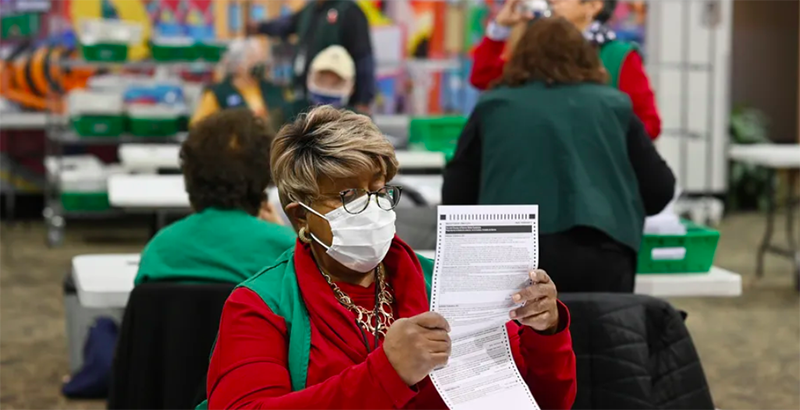Denver School Board Candidates Backed By Union Maintain Their Lead

Get stories like this delivered straight to your inbox. Sign up for The 74 Newsletter
The union-backed majority on the Denver school board appears poised to consolidate power, with all four candidates endorsed by the teachers union leading as ballot counting continues through the week. If the four win their elections, the board would be unanimously union-backed for the first time in recent history.
Scott Esserman, a parent and former classroom teacher who was endorsed by the union, held a strong lead Thursday night in the race for an at-large seat representing the entire city. In a crowded field of five candidates, he had garnered more than 39% of the vote.
Current school board President Carrie Olson had a commanding lead — 69% of the vote — over her challenger in District 3, which spans central-east Denver. Olson is a former Denver teacher who was endorsed by the union. She is the only incumbent running for reelection.
The races were tighter in southwest District 2 and northeast District 4, with union-backed candidates Xóchitl “Sochi” Gaytán and Michelle Quattlebaum holding leads in their districts as well. The District 2 race was particularly tight, though Gaytán’s lead over opponent Karolina Villagrana widened from 64 votes Tuesday night to 486 votes Thursday.
Denver elections officials said Thursday night there were 44,690 ballots left to count and that counting would continue Friday. A large number of ballots — 35,000 — were dropped off during the last three hours of voting Tuesday, which is extending the time it takes to tally all the votes, officials said.
Union-backed members have held a majority of seats on the seven-member Denver school board since a historic “flip” in 2019. Before then, Denver had been a national exemplar of education reform and cooperation with charter schools.
Reached Tuesday night, Esserman said that although the union-backed candidates were outspent by pro-reform groups pushing for a different slate, the election results so far were “a testament to the kind of change people are ready to see” in Denver Public Schools.
“The vast majority of voters and members of our community are interested in seeing us do what’s best for students, and that’s what we’re going to do,” he said.
In the past two years, the union-backed board has undone or halted many reforms put in place by previous boards.
For instance, the board voted to reopen two comprehensive high schools — Montbello High and West High — that previous boards had dismantled. Current board members also got rid of the controversial school ratings system that previous boards used to justify closing low-scoring schools in an attempt to improve academic achievement. The union opposes such closures.
The union also opposes the expansion of independent charter schools. The union-backed board attempted to delay the opening of a new DSST charter high school, but the State Board of Education overturned that decision.
The union has spent big to hold on to its board majority, but supporters of education reform have spent even bigger to try to win back control. They say the union-backed board hasn’t focused enough on academics, especially during the pandemic.

As of last Monday, state campaign finance reports show independent expenditure committees associated with reform groups had spent more than $1.07 million in support of three candidates: Villagrana, Vernon Jones Jr., and Gene Fashaw. Such committees can spend unlimited amounts of money in elections but cannot coordinate with candidates.
Meanwhile, reports show the Denver teachers union had given more than $157,000 directly to four candidates: Esserman, Olson, Gaytán, and Quattlebaum. The statewide teachers union gave at least another $75,000. Independent expenditure committees funded by teachers unions had spent more than $184,000 in support of those candidates, reports show.
Esserman had raised more money — $106,650 — than any other school board candidate in Colorado, even with expensive races in many suburban districts, according to an analysis of campaign filings by Follow the Money Colorado.
The winners of the election will oversee a new superintendent, craft a new strategic plan, and grapple with several long-simmering issues, including declining enrollment and continued disagreement over the role of independent charter schools and semi-autonomous innovation schools. They will also help lead a district that is still navigating the COVID-19 pandemic.
Chalkbeat is a nonprofit news site covering educational change in public schools.
Get stories like these delivered straight to your inbox. Sign up for The 74 Newsletter

;)